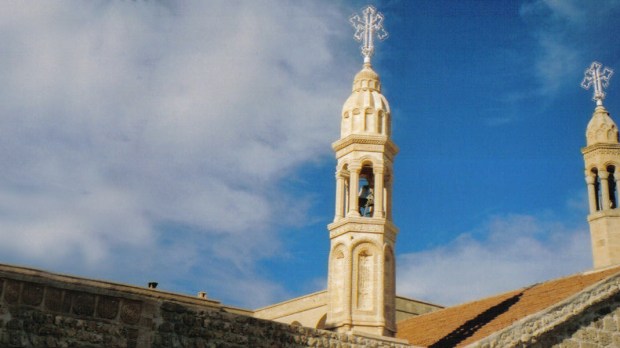Help Aleteia continue its mission by making a tax-deductible donation. In this way, Aleteia's future will be yours as well.
*Your donation is tax deductible!
Turkey’s appropriation of Syriac Church property represents a reversal from Ankara’s policies towards Christian minorities, says an expert on Turkey.
Those policies have heretofore been “considerably more generous than towards Jews, (non-Sunni) Alevis, and atheists,” said Lisel Hintz, Visiting Assistant Professor in the Political Science Department of Barnard College of Columbia University in New York. “Even just two years ago pro-government newspapers were reporting on Assyrians’ grateful embrace of the Justice and Development Party (AKP).”
That is the party of Turkish President Recep Tayyip Erdogan.
Headlines that began to appear toward the end of June suggested that Erdogan has “seized” about 50 church properties in Mardin Province in southeastern Turkey, including churches and cemeteries. Christians both within the country and abroad vowed a fight.
The controversy has its roots in 2008, when villages in the area incorporated into a metropolitan municipality called Mardin and were redesignated as neighborhoods. The state redrew the boundaries of the Mor Gabriel Syriac monastery along with that of the surrounding villages, saying it was necessary to update the land registry, according to a blog written by Turkey scholar Jenny White. The resulting new boundaries took large parcels of land from the monastery and gave them to the villages. The monastery took the matter to court.
In 2012, a “Liquidation Committee” began to redistribute property of “institutions whose legal entity had expired,” according to an Armenian newspaper based in Istanbul, Agos. The transfer and liquidation procedures are ongoing. Agos explained:
In 2016, the Transfer, Liquidation and Redistribution Committee of Mardin Governorate transferred to primarily the Treasury as well as other relevant public institutions numerous churches, monasteries, cemeteries and other assets of the Syriac community in the districts of Mardin. The Mor Gabriel Monastery Foundation appealed to the decision yet the liquidation committee rejected their appeal last May. The churches, monasteries and cemeteries whose ownerships were given to the Treasury were then transferred to the Diyanet.
The Diyanet is Turkey’s religious affairs ministry.
The monastery is 1,600 years old. It’s been paying taxes to the Turkish Republic, which is less than 100 years old, since 1938.
“We started to file lawsuits and in the meantime our enquiries continued,” Kuryakos Ergün, Chairman of Mor Gabriel Monastery Foundation, told Agos. Ergün said they would appeal to the court for the cancellation of nearly 30 title deed registries.
“Historically, the Diyanet has been accommodating of Syriac Christian efforts to regain ownership of historic churches, but never if currently used as a mosque, only if abandoned or a museum not converted to mosque,” said Ed Stafford, a former foreign service officer in Turkey.
“Mardin is in many ways Turkey’s most diverse province, often referred to, if in a somewhat idealized fashion, by Turkish citizens I’ve interviewed as a model of co-habitation and co-existence among people of varying ethnic and religious identities,” Hintz said in an email. “In my view this seizure is indicative of injustice not only against Assyrians, but against Kurds and other groups whose treatment under the AKP seems to fluctuate according to the whims and interests of the party.”
Lisel called the seizure a violation of the 1923 Treaty of Lausanne. In a brief filed at the Civil Court of First Instance in Mardin, the Mor Gabriel Monastery Foundation said the in the Lausanne Treaty the Turkish government granted “full protection to the churches, synagogues, cemeteries, and other religious establishments of the above-mentioned minorities (non-Muslims). All facilities and authorization will be granted to the pious foundations, and to the religious and charitable institutions of the said minorities at present existing in Turkey, and the Turkish Government will not refuse, for the formation of new religious and charitable institutions, any of the necessary facilities which are granted to other private institutions of that nature.”
Ergün, of the Foundation for Mor Gabriel Monastery, said in a statement June 28: “The decision is illegal and it has been clearly violated that our right to property protected by the European Convention on Human Rights and Our Constitution, which is the side of Turkey, has been removed as well as the security provided by the Minorities of the Lausanne Treaty, which is the constitutional agreement of our State, to the places of worship and cemeteries.
“The violation here is in fact far beyond a simple violation of rights,” Ergün continued. “Here, we have taken a decision that is very spiritual and very profound, both in the region and in the diaspora of our Syriac citizens. A culture and a history are being destroyed. One of the most important colors in our geography is the place where the Syriac culture is fading. We would like to remind you again that our differences are in fact the most important wealth that holds us together.”
The United States Commission on International Religious Freedom, in its 2017 report, said that the Turkish government had expropriated religious minority properties in the past, and that beginning in 2003, more than 1,000 properties—valued at more than 2.5 billion Turkish lira ($1 billion U.S.)—have been returned or compensation paid.
“The process is still ongoing, although some minority communities have complained about delays and denials,” the report said. “In addition to returning or providing compensation for properties, in 2016 the Turkish government paid for the utility costs of 419 minority places of worship, including 355 churches, 24 chapels, and 40 synagogues.”
A request for comment from the Turkish Embassy to the United States was not answered.

